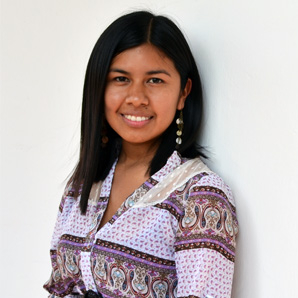
When many Zapotecs left their Mexican town of Santiago Zoochila to re-settle in Lynwood, California, they did so with hopes and dreams of a better life. Soon, however, this tight-knit indigenous group that does not speak Spanish as its first language realized it was losing its cultural customs.
Scripps College’s Melissa Mesinas ’12 whose mother lives in Santiago Zoochila decided to step in and create a class for children of Zapotec ancestry born in the United States.
Mesinas, 21, the salutatorian for her graduating class at Lynwood High School, says she chose to do this project in her hometown of Lynwood “because there is a strong Zapotec community that is passionate about preserving its culture, but in need of resources to accomplish that goal.”
She knew these classes would have to be taught in three languages: English, Spanish, and Zapotec because the students born in this country primarily speak English and some Spanish, even though their parents primarily speak Zapotec and some Spanish.
“I wholeheartedly believed that a class where students could learn about their culture from members of their own community would provide a unique and moving forum,” says Mesinas, who is fluent in Spanish. “It gave this young population the opportunity to learn more about themselves.”
Mesinas, a Gates Millennium Scholar, was awarded a Stanley and Mary Johnson Student Research Award grant from the College last year to conduct her research and create her classes.
Last summer, Mesinas spent five weeks in the town of Santiago Zoochila, which is in the southwestern Mexican state of Oaxaca, to meet teachers who speak and teach Zapotec and to document the daily activities of the Zapotecs. She discovered that the teachers recently launched an initiative to teach others in their town how to read and write Zapotec because, until a few years ago, it was an oral language with no written history, Mesinas says.
While in Oaxaca, Mesinas took private tutoring lessons from the teachers so she could work on her enunciation of the indigenous language before returning to Lynwood. Mesinas, a dual major in psychology and Hispanic studies, chose to tackle one of the most challenging Mexican indigenous languages, given that researchers have identified several regional variations and dialects of the Zapotec language.
Once on U.S. soil, Mesinas met with officials from Lynwood Unified School District so she could reserve a room for her classes. She prepared five weeks worth of lesson plans on such topics as Mexican geography and history and the daily rituals of the indigenous who live in Santiago Zoochila.
Twenty students, ranging in age from 6 to 22, enrolled in the class. Mesinas split the class and offered two sessions, instead of one. Each class met for two hours, twice weekly. They learned that the late Mexican President Benito Juarez was also a Zapotec.
“The fact that she had two classes shows how much they wanted these resources,” says Leslie Mendoza ’12, Mesinas’ best friend. Mendoza is not of Zapotec ancestry, though she also grew up in Lynwood. “Language is a big part of their culture.”
Mesinas used her research for her senior thesis, which she plans to publish. She was invited to speak about her work at the University of Southern California in February. While there, a representative from the Los Angeles County Museum of Art approached her to possibly collaborate on an exhibition about indigenous communities in Los Angeles. In March, Mesinas won an award from the statewide nonprofit, Hispanas Organized for Political Equality.
“I want to help get us Zapotecs on the map,” Mesinas says.

